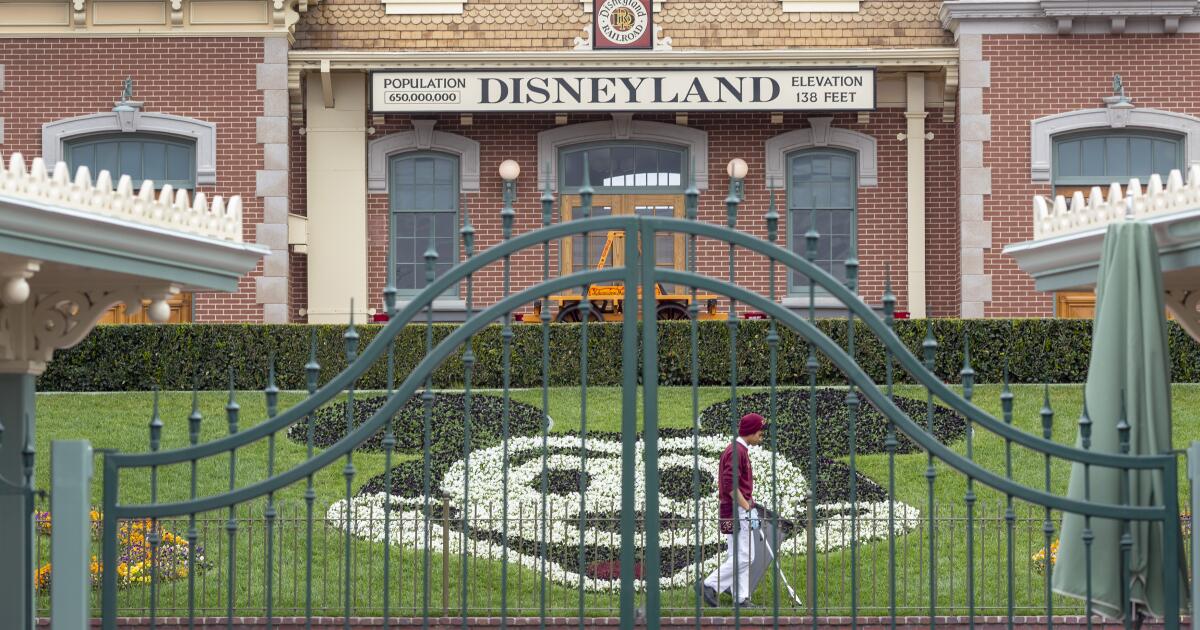O.C. judge approves $233-million settlement agreement between Disney and workers alleging wage theft

The Walt Disney Co. will soon issue back pay to tens of thousands of Disneyland employees who claimed they were denied a minimum wage set by Anaheim voters.
The $233-million, class-action settlement approved Tuesday by Orange County Superior Court Judge William Claster was lauded by attorneys representing the employees as the largest of its kind in California history.
“The settlement is absolutely historic,” said Randy Renick, an attorney representing the workers. “It is an incredible result after a seven-year battle that began when the workers could not persuade Disney to pay them a living wage, so they took it to the voters of Anaheim.”
The agreement covers 51,000 past and present workers and marks an end to a years-long legal fight over whether the “living wage” law passed by Anaheim voters in 2018 applied to the theme park. The law stipulates that employers that receive city tax subsidies, or are located in the Resort District, must pay more than the local minimum wage.
“Disney cares deeply about our cast members and we are pleased that this matter is nearing resolution,” Jessica Jakary, a Disneyland Resort spokesperson, said, using the term the company uses for employees. “We are proud to already offer some of the most competitive wages and comprehensive employee benefits in our industry.”
Today, Jakary noted, nearly 96% of Disney workers in the Resort District make over $22 an hour — more than $1.50 above the current $20.42 minimum for employees covered under the local law.
In December, the Burbank-based entertainment company agreed to the massive settlement and began paying hourly rates in accordance with the city’s rate, known by its ballot designation, Measure L.
Labor unions representing the workers first banded together in 2018 to campaign for wage ballot initiative that set first year hourly pay at $15 — and then rose with inflation in subsequent years — for employers that met location, size and tax criteria. Anheim voters went on to pass Measure L but Disney argued it was exempt from the tax-rebate element when the ordinance took effect on Jan. 1, 2019.
The class-action lawsuit filed later that year argued that the company indeed held tax-rebate agreements with Anaheim.
The legal fight ended in 2023 when the California Supreme Court declined to hear an appeal from Disney after an appellate court found that the company had illegally skirted the mandated pay scales.
Payments are expected to begin 60 days from the date the judge granted final approval.
Rafael Rendon, a custodial worker at Disney’s California Adventure who has worked for the company since 2014, welcomed a settlement that will grant him more than $8,000.
“I’m going to put that into savings for now,” he said, adding that he knows of cast members receiving as much as $10,000. “This has been a long time coming. I know a lot of co-workers that I’ve talked to are relieved that final approval has been granted. They’re just hoping payments come before the end of the year so that they be able to spend in time for the holidays.”
Lisa Phillips, a professor of labor history at Indiana State University, said she hopes the surprising size of the historic settlement bears weight going forward.
“It could be game-changing,” she said. “If Disney can be held accountable to the tune of $233 million, and if this case gets the attention that it should, perhaps wage theft will be examined a little closer.”
In his ruling, Claster opined that the “settlement was exceptional— essentially 100% of the wages owed to 51,000 employees … plus interest and 401(k) contributions.”
Renick deemed the agreement as “perhaps the best settlement on behalf of workers in U.S. history.”
According to Good Jobs First’s violation tracker, only a handful of standalone wage theft cases nationwide have surpassed it.
In 2016, a lawsuit against Walmart ended with a $242-million judgment for a class of 186,000 past and present workers. Ultimate Fighting Championship agreed in 2024 to pay $375 million to settle an antitrust lawsuit.
Phillips, who has researched Disney labor relations for years, noted that the settlement marks a fraction of the company’s $91 billion in total revenue last year, but will be meaningful for workers.
“Whatever back pay they’re going to get from the settlement is going to make a world of difference for people who live on these margins,” she said. “There has to be some way for corporations to understand that their profit margin is so large that they’re benefiting from people who are almost homeless.”
In finalizing the payout, attorneys for the workers will receive roughly $35 million in fees, or 15% of the Disney settlement. Renick said that the legal team worked to reduce its percentage by more than half of the typical contingency fee.
“This wasn’t an attorney-driven piece,” he added. “We just came in to fulfill the will of the workers and of Anaheim voters.”
In addition to Disney, Claster later in the week signed off on a related $1.75-million settlement with SodexoMagic, a subcontractor that operates restaurants and coffee shops in the Disneyland Resort. Magic Johnson is a partner in SodexoMagic.



